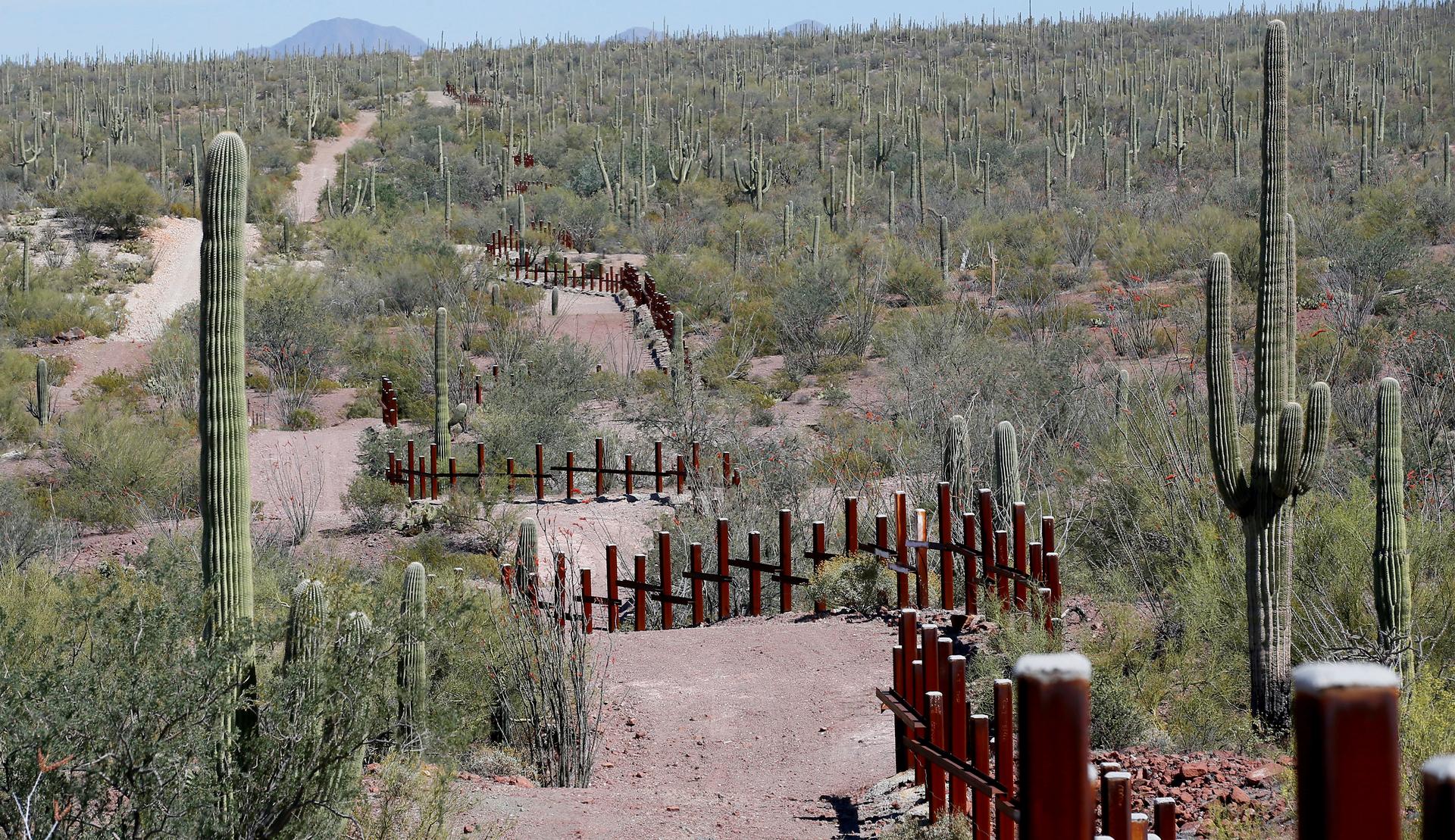President Trump, will Native American sovereignty make a difference when you decide to build a wall or not?
The vehicle barrier on the US-Mexico border weaves around Saguaro cactus in the Sonoran desert on the Tohono O'odham reservation in Chukut Kuk, Arizona, on April 6, 2017.
Over President Donald Trump's first 100 days, we're asking him questions that our audience wants answers to. Join the project by tweeting this question to @realDonaldTrump with the hashtag #100Days100Qs.
#100. @realDonaldTrump, will Native American sovereignty make a difference when you decide to build a wall or not? #100Days100Qs
The final question in our #100Days100Qs series is about Native American independence. The Tohono O'odham Nation's land resides in the southern part of Arizona and in the Mexican state of Sonora. A portion of the Tohono O'odham's reservation — a 75-mile stretch of land near the border — happens to be right in the middle of where President Donald Trump wants to build the wall. Tribal officials and Tohono O'odham citizens are not in favor, saying: "Over my dead body," according to an Arizona Republic story.
So, we're wondering, what role will Native American sovereignty play in the president's decision to build a wall.
Tohono O'odham culture goes back thousands of years. Their way of life — and ceremonies — are centered around the Southwest landscape. In fact, their name means "desert people." At one time, the nation had an enormous area of land that extended further north and south, in both Arizona and Mexico. That land was reduced to a quarter of its original size following the Treaty of La Mesilla, or the Gadsden Purchase, which was signed in 1853 by the United States and Mexico to end land disputes.
In the midst of that, however, the US and Mexico failed to involve the Tohono O'odham. They were never consulted about the division of their land or the problems it would bring about within the tribe.
The Tohono O'odham Nation and other tribal governments have long been recognized by the US as sovereign nations.
As proof of that, more than 370 treaties have been signed between the United States and tribal governments since the 1700s. Most are still legally binding. Historically, treaties were how the US acquired much of its land; these agreements also established government-to-government relationships between tribes and the US. And, while many promises the US made in those treaties have been broken, Native American tribes still rely on them when negotiating disputes over land and natural resources.
“There is no word for wall in our language,” Tohono O’odham's vice chairman, Verlon Jose, told the Arizona Republic at a recent rally protesting the border wall. He's been a vocal opponent of the wall since before Trump was elected. If plans go forward to seize land for the border wall, he said he would try diplomacy at first. But he's prepared to stage a protest rivaling Standing Rock if need be.
What rights do the Tohono O'odham have when it comes to this issue? Plenty, says Cris Stainbrook of the Indian Land Tenure Foundation. "They're a sovereign nation, and they have a right to not have an artificial barrier dividing their land in two." Stainbrook says the US government could build the wall under the premise that it's a national security issue, but it would have to go to great lengths to show that any security issue warrants a wall on this land. "It's a taking of their land," Stainbrook explained.
Today, the Tohono have families on both sides of the border. A wall would complicate their ability to move back and forth on their land. Even without Trump's wall, many complain of harassment from border patrol officials.
"They feel like occupied people because of the increased border patrols," said Juanita Molina, the executive director of Border Action Network, a Tuscon-based human rights group that tracks abuses by the Customs and Border Protection. She says that freedom of movement was already restricted because of SB 1070, a law passed in 2010 in the Arizona Legislature and the US Congress that, among other things, "made it a crime to fail to carry registration papers and for people in the country illegally to solicit work," an LA Times story says.
It drew lots of attention and controversy from groups like Border Action Network who say it was a way to target Latinos. Molina says that Tohono O'odham citizens traveling back and forth between Mexico and the United States to see family or conduct tribal ceremonies have been denied entry and harassed. Also, items used for ceremonies have been confiscated, and some citizens have even been deported.
For the Tohono O'odham, dealing with the Border Patrol and Customs is complex. Just as cities along the border struggle with the illegal drug trade, so do citizens of the Tohono O'odham Nation. The tribe relies on a mix of its own police force and border patrol agents to keep drug trafficking off their land.
President Trump doesn't have a good track record when handling American Indian affairs: He's called into question some tribes' right to gaming compacts, cleared the way for the Dakota Access Pipeline and referred to US Sen. Elizabeth Warren as "Pocahontas," which many consider a racial slur.
So, we're wondering, President Trump, in the process of thinking through your border wall — will you honor the sovereign nation of Tohono O'odham?
If you'd like to know the answer to that, too, click here to tweet it to the president.
Every day, reporters and producers at The World are hard at work bringing you human-centered news from across the globe. But we can’t do it without you. We need your support to ensure we can continue this work for another year.
Make a gift today, and you’ll help us unlock a matching gift of $67,000!
